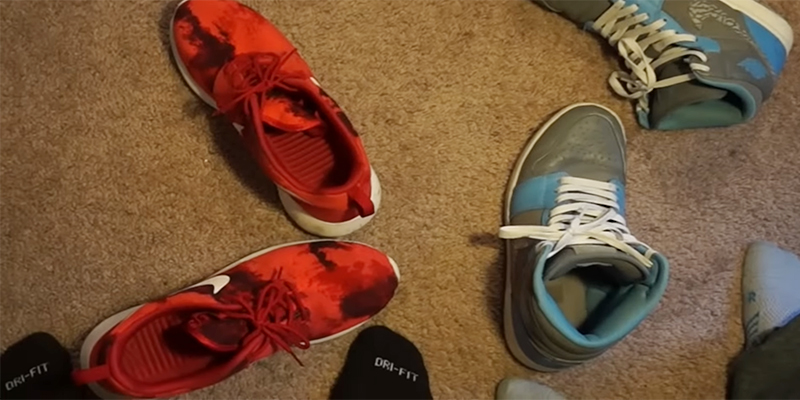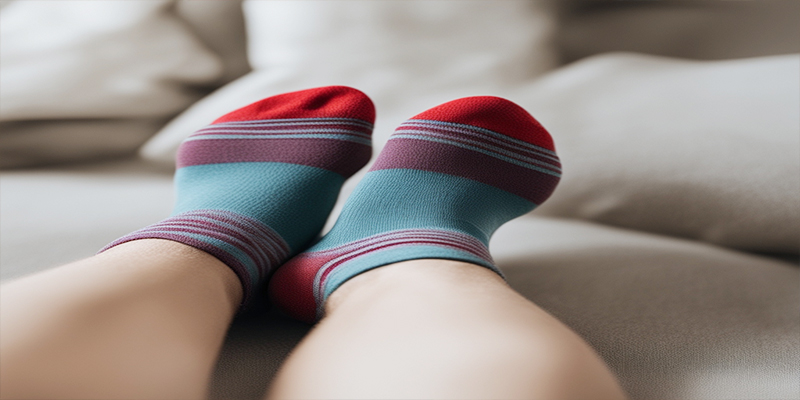Knowing why do your socks smell so bad is the half work done to get rid of it and the rest half will also be done when you take action against the unpleasant odor.
The unpleasant odor emanating from socks is a common concern that many individuals grapple with daily. Despite efforts to maintain personal hygiene, the persistent stench often leaves individuals wondering: why do my socks smell so bad?
The answer lies in a complex interplay of factors, ranging from sweat and bacteria to fungal infections and poor ventilation. Understanding the multifaceted nature of foot odor is crucial in implementing effective strategies to combat it and maintain fresh, odor-free feet.

Why Do My Socks Smell So Bad? -6 Practical Reasons
The unpleasant smell emanating from your socks is commonly caused by a combination of factors, primarily involving bacteria and sweat.
Here are the reasons why your socks smell so bad:
1. Sweat
The human body uses sweat as a natural cooling mechanism, particularly in areas with high concentrations of sweat glands like the feet.
However, when sweat becomes trapped within the confines of socks and shoes, it creates a breeding ground for bacteria.
The warm and damp environment inside your footwear provides an ideal setting for bacteria to thrive and multiply.
As sweat accumulates, it saturates the socks and creates a humid microclimate, exacerbating the problem.
2. Bacteria
The diverse community of bacteria that inhabit human skin includes species that are particularly adept at breaking down sweat components.
These bacteria, such as Corynebacteria and Staphylococcus epidermidis, metabolize the sweat’s proteins and lipids, producing volatile compounds with strong odors.
These compounds include thioalcohols, thioesters, and ammonia, which give rise to the characteristic smell associated with sweaty feet.
Additionally, some bacteria produce enzymes that further degrade sweat, intensifying the odor.
3. Poor ventilation
The choice of footwear plays a crucial role in foot odor. Shoes made of synthetic materials or those lacking sufficient ventilation impede air circulation, trapping moisture and heat.
As a result, sweat accumulates within the shoes, providing an optimal environment for bacterial proliferation.
Closed-toe shoes, especially those with rubber soles, further exacerbate the problem by restricting airflow.
Additionally, wearing socks made of non-breathable materials exacerbates the issue by hindering moisture evaporation.
4. Unwashed socks
Failure to launder socks regularly allows sweat and bacteria to accumulate within the fabric fibers. Over time, these residues build up and contribute to persistent foot odor.
When worn, unwashed socks reintroduce bacteria and sweat onto the skin, perpetuating the cycle of odor production.
Furthermore, socks worn multiple times without washing may harbor fungal spores, increasing the risk of fungal infections such as athlete’s foot.
5. Fungal Infections
Fungi thrive in warm, moist environments, making the feet an ideal habitat.
Athlete’s foot, caused by fungi such as Trichophyton and Epidermophyton, can lead to itching, redness, and the formation of blisters and cracks between the toes.
In addition to causing discomfort, fungal infections contribute to foot odor by altering the microbial ecosystem of the skin and releasing metabolic byproducts with distinct odors.
6. Poor Hygiene
Effective foot hygiene involves washing the feet daily with soap and water to remove sweat, bacteria, and dead skin cells.
Neglecting foot hygiene allows these substances to accumulate, providing nutrients for bacteria and fungi to thrive.
Moreover, failing to dry the feet thoroughly after washing or wearing damp socks prolongs the moist environment, fostering bacterial growth.
Regularly trimming toenails and exfoliating rough patches of skin can also help reduce bacterial reservoirs and minimize foot odor.

How Do I Stop My Socks From Smelling?
Preventing your socks from smelling requires a combination of proper foot hygiene, appropriate sock and shoe choices, and proactive odor-control measures.
Here are 7 effective strategies to stop your socks from smelling:
1. Practice Good Foot Hygien
Maintaining proper foot hygiene is essential for preventing foot odor. Start by washing your feet daily with warm water and a mild soap.
Pay close attention to the spaces between your toes where bacteria and fungi tend to thrive. After washing, ensure your feet are thoroughly dried, especially between the toes, as moisture can exacerbate odor-causing bacteria.
Consider using a soft towel to gently pat your feet dry rather than rubbing them vigorously, which can irritate the skin.
Additionally, using a mild antiseptic or antibacterial soap can help reduce the microbial load on your skin, further minimizing foot odor.
2. Choose Breathable Socks
Selecting the right type of socks can make a significant difference in preventing foot odor. Opt for socks made from breathable materials such as cotton, wool, or bamboo.
These natural fibers allow moisture to evaporate more effectively, reducing the likelihood of bacterial growth.
Avoid synthetic fabrics like nylon or polyester, which tend to trap moisture and contribute to odor buildup.
If possible, consider investing in moisture-wicking socks designed specifically to draw sweat away from the skin and promote evaporation, keeping your feet dry and comfortable throughout the day.
3. Rotate Your Socks
Rotating between multiple pairs of socks is key to preventing odor buildup. By allowing your socks to air out between wears, you reduce the risk of moisture becoming trapped inside the fabric, creating an ideal environment for bacteria to thrive.
Store your socks in a well-ventilated area to facilitate drying between uses. Avoid wearing the same pair of socks for consecutive days, even if they appear clean, as this can lead to the accumulation of sweat and bacteria.
Instead, alternate between different pairs of socks to give each pair ample time to air out and dry completely.
4. Wear Breathable Footwear
Choosing footwear made from breathable materials is essential for preventing foot odor. Look for shoes constructed from leather, canvas, or other breathable fabrics that allow air to circulate around your feet.
Avoid wearing tight-fitting or non-breathable shoes for extended periods, as they can trap sweat and bacteria, exacerbating foot odor.
If your shoes become wet or damp, remove the insoles and allow them to air out separately to speed up the drying process.
Additionally, consider using shoe trees or cedar shoe inserts to absorb excess moisture and neutralize odors between wears.
5. Use Odor-Control Products
Incorporating odor-control products into your foot care routine can help combat foot odor effectively.
Apply foot powders or sprays containing antifungal and antibacterial agents to your feet and inside your shoes to help control odor-causing microbes.
These products work by killing or inhibiting the growth of bacteria and fungi, reducing the risk of odor formation.
Additionally, consider using odor-absorbing insoles or shoe liners to absorb excess moisture and neutralize odors inside your shoes.
Activated charcoal shoe deodorizers or sachets can also be effective at absorbing moisture and eliminating odors, keeping your shoes fresh and odor-free.
6. Launder Socks Properly
Properly laundering your socks is essential for maintaining their cleanliness and preventing foot odor.
Wash your socks in hot water with a quality laundry detergent after each wear to remove sweat, bacteria, and odor-causing residues.
Consider adding vinegar or baking soda to the wash cycle for extra odor-fighting power. Ensure your socks are thoroughly dried before wearing them again, as damp socks provide an ideal environment for bacterial growth. Avoid using fabric softeners or dryer sheets when laundering socks, as they can leave behind a residue that traps odor-causing bacteria.
7. Treat Fungal Infections Promptly
When you notice symptoms of a fungal infection such as athlete’s foot, such as itching, redness, or peeling skin, it’s essential to seek treatment promptly.
Fungal infections can contribute to foot odor and discomfort if left untreated. Over-the-counter antifungal treatments such as creams, sprays, or powders can help eliminate the fungus and alleviate symptoms.
Additionally, consider incorporating natural remedies such as tea tree oil or apple cider vinegar into your foot care routine to help combat fungal infections.
Keep your toenails trimmed short and clean to reduce the risk of fungal infections spreading from the nails to the surrounding skin.
To Recap
The unpleasant odor emanating from socks is primarily attributed to a combination of factors, including sweat, bacteria, and poor ventilation.
Sweat, produced abundantly by the feet, creates a conducive environment for bacterial proliferation when trapped within socks and shoes.
Bacteria naturally present on the skin thrive in this warm, damp setting, breaking down sweat into compounds that produce odor.
Additionally, wearing socks made of non-breathable materials and inadequate shoe ventilation exacerbates the problem by impeding moisture evaporation.
Proper foot hygiene, breathable socks and footwear choices, regular sock rotation, and use of odor-control products are crucial in combating foot odor.
By addressing these factors, individuals can effectively minimize foot odor and maintain optimal foot health and hygiene.